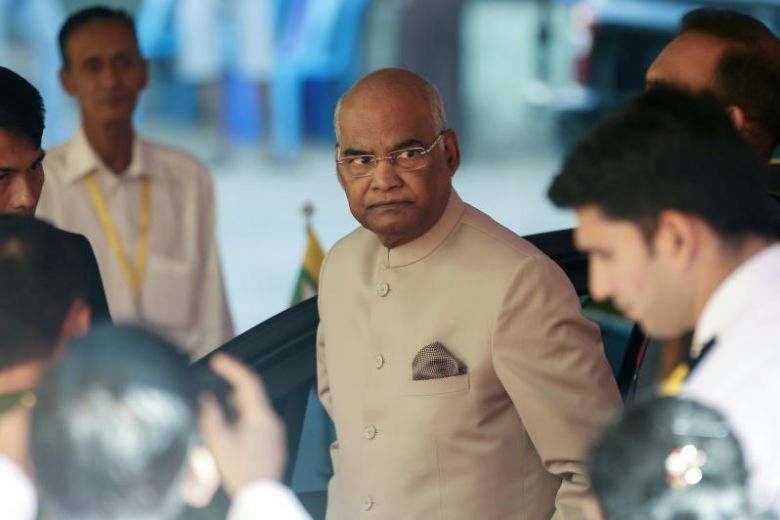With China on its mind, India deepens engagement with Myanmar

Indian President Ram Nath Kovind concluded a five-day state visit to Myanmar on Dec 14.PHOTO: EPA-EFE
NEW DELHI — Indian President Ram Nath Kovind concluded a five-day state visit to Myanmar last Friday (Dec 14), during which India sought to synergize its Act East and Neighborhood First initiatives with Myanmar’s “independent, active and non-aligned” foreign policy.
The presidential visit to Naypyidaw, the first since 2006, came a little over a month after China and Myanmar finalized a deal to build a deep sea port in Kyaukpyu on Myanmar’s western coast in the Bay of Bengal. It gives China an alternative route for energy imports from West Asia and avoids potential choke points in the Malacca Strait.
In India, however, it is perceived more as a security nightmare – the latest addition to a Chinese “string of pearls” across the Indian Ocean that comprises ports such as Gwadar in Pakistan and Hambantota in Sri Lanka. Though built as commercial entitles, India fears that these projects will allow the Chinese military greater access into its extended neighborhood.
It is this fear of strategic encirclement by China and loss of influence to Beijing that explains India’s decision to court Myanmar by offering to fund and work on a range of development projects there and boost connectivity with the country.
This is also why it has adopted a more realpolitik-driven approach that falls shy of censuring the country for its military’s role in committing human rights violations against the Rohingyas in Rakhine state.
Article continues after this advertisementDuring his visit, the Indian President appreciated Myanmar’s “ongoing efforts toward achieving peace and national reconciliation in the country”.
Article continues after this advertisementHe also handed over the first 50 units of prefabricated houses meant for Rohingya refugees built in Rakhine state with money from the Indian government. India has also said it may expand the Rakhine State Development Program, once the current allocation of US$25 million (S$34.4 million) is “fully committed”.
“The Chinese influence is pervasive and writ large on the entire foreign policy of India, and it is especially acute when it comes to neighbors like Myanmar,” said Professor Swaran Singh, who teaches at the School of International Studies at Jawaharlal Nehru University.
“It is so pervasive because of the enormity of both the magnitude and speed with which the Chinese are expanding their footprint and building their infrastructure in Myanmar,” he told The Straits Times.
The two countries also signed a Memorandum of Understanding in September to establish the China-Myanmar Economic Corridor, which forms part of Beijing’s Belt and Road Initiative (BRI). China has already constructed dual-carriage motorways connecting Kunming, the capital of Yunnan province, with towns on the Myanmar border.
China also enjoys a historical edge, as it has always stood by the military junta in Myanmar, unlike India which heavily criticized the Myanmar regime in the 1990s for its suppression of the democracy movement.
Playing catch up, India has launched a range of connectivity projects, including a trilateral India-Myanmar-Thailand highway, tested bus services and opened border markets. It is also working with Myanmar to develop the Kaladan Multi Modal Transit Transport Project, that connects the East Indian city of Kolkata to the port in Sittwe, the capital of Rakhine state, which is then further connected to India’s north-east via inland road and river networks.
Myanmar occupies a central place in India’s Act East and Neighborhood First policies. Its importance comes from the fact that the country is the only physical gateway for India to connect with South-east Asia and beyond. It shares a 1,600km land border with India.
The country is also a key security partner in India’s campaign against different insurgency groups, some of whom have a presence in Myanmar.
China has often been accused of supporting rebel groups in India’s north-eastern states, who also depend on supply of arms from there.
“It is important for us to see that China doesn’t have too much of a presence in the sensitive zone around the north-east. China’s presence in Myanmar immediately raises this concern… even today you see weapons of Chinese marking in this region,” Prof Singh added.
But both India and China realise there is more to gain through cooperation than rivalry. This is why they have attempted a turnaround from the confrontational stance they had adopted since the 2017 border standoff.
The Wuhan summit in April this year between Prime Minister Narendra Modi and Chinese President Xi Jinping laid the ground for their countries to work together for the benefit of the region and beyond.
The first such instance of Indo-Sino cooperation after the Wuhan summit was the joint training of a batch of Afghan diplomats at the Foreign Service Institute in New Delhi in October.
Last month, the Chinese ambassador to India, Mr Luo Zhaohui, even suggested that the two countries exploit the synergies between China’s BRI and India’s Act East policy.
“The Chinese have realized that their big infrastructure development projects face enormous problems on two fronts – commercial viability and political legitimacy,” said Prof Singh.
“Having India on board with them brings both these things. If India starts using ports such as Gwadar, Kyaukpyu and Hambantota, they will become commercially viable. They understand this, which is why they are cultivating and courting India very clearly,” he added.